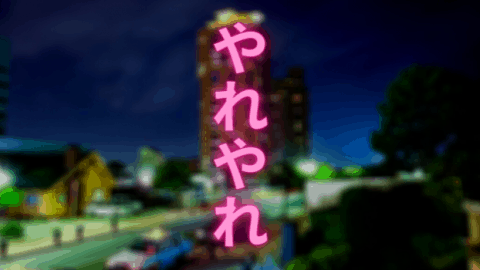If you watch enough anime, you’ve probably heard yare-yare a thousand times.
In fact, you may have heard it so often that you think you understand the meaning of this deceptively simple phrase.
However, there’s a good chance you’ve missed at least a bit of the nuance behind this surprisingly layered expression.
In this article, I’m going to break down yare-yare for you and show you a bunch of different ways it can be used.
But first, let’s start simple…
What is the meaning of yare-yare?
Yare yare (pronounced “yah-ray yah-ray”) is an exclamation that can show relief or annoyance, often without a strong sense of enthusiasm. It’s similar to a sigh, “Oy vey,” or “good grief.”
Dictionary definitions of yare-yare
I’ve had to use a variety of sources to better understand this nuanced word. Before we look at that, it’s worth noting that yare yare has no kanji form that I can find.
It’s most commonly written in hiragana as やれやれ, though I’m sure you’ll see it in katakana (as ヤレヤレ) now and then for emphasis or other reasons.
The most commonly used Japanese-English dictionary on the internet translates it rather simply as a mix of “oh!; ah!; oh dear!; good grief!; dear me!; thank God!”
If we dig into an actual Japanese dictionary, we get three parallel definitions.
The first translates roughly to say, “Something you say when you’re really strongly moved, or when some hardship or anxiety has been resolved.” They give two example sentences for illustration:
やれやれ、これで安心
Yare-yare, kore de anshin
Oh man, this is a relief.
やれやれ、たいへんな人もいたものだ
Yare-yare, taihen-na-hito mo ita mono da.
Jeez, there were a ton of people.
The second translates roughly to, “Something you say when there’s some unexpected difficulty, or you’re exhausted/discouraged.” We get another two example sentences to help us discern the meaning better:
やれやれ、困ったことになったぞ
Yare-yare, komatta-koto ni natta zo
Crud, I’m in trouble now.
やれやれ、いやになってしまった
Yare-yare, iya ni natte-shimatta.
Ugh, I’m getting sick of this.
And, finally, we get, “Something you say when you feel sympathy for someone’s misfortunes.” We get only one example sentence for this one, but it’s pretty illustrative by itself:
やれやれ、かわいそうに
Yare-yare, kawaiso-ni
Oh dear, the poor thing!
A native speaker’s definition of yare-yare
One native speaker says that it “expresses a mix of relief, mild dismissal, and mild annoyance without being too serious.” They elaborate by saying it indicates a “lack of enthusiasm” and almost never expresses intense emotions.
To illustrate this better, they use a scene from the anime JoJo’s Bizarre Adventure in which JoJo, a rather serious and masculine character, is given a sweet goodbye kiss by his mom.
He walks away, muttering, “Yare yare da ze.” According to this native speaker, “he felt embarrassed by his mother’s excessive displays of affection but at he same time he doesn’t completely hate it either.
But there’s also a bit of relief because now he’s finally by himself.”
They go on to say that it’s also used to agree to something even when you’re not really enthusiastic about doing it.
And, playing off this, it can be a way of masking your enthusiasm, by making you sound unenthusiastic, even though you actually are.
It’s used in this somewhat ironic sense by many teenage boys who are concerned with seeming too earnest.
The origin of yare yare
According to one source, yare developed from simple exclamations used to get someone’s attention, like “Ya!” or “Yai!” (similar to “Yo!” in English).
It then took on the やれ form, used as an interrogation, like, “Hey! Who’s there?” It then moved from an interrogation to capture a meaning sort of like, “Oh man, this sucks.” The extra やれ was tacked on to increase the emphasis.
There are other theories on its origin, but this one seems most likely to me.
Contrary to expectations, it does not seem to be related to やる.
What’s the meaning of yare yare daze?
“Yare yare daze” is probably best known as the catchphrase of the titular character in JoJo’s Bizarre Adventure. But what does the “daze” (pronounced “dah zay”) do in the expression? Well, it’s actually two things. First is the da part, which is easy enough to explain. It’s grammatically necessary to connect “yare yare” to “ze”. That’s all.
So, what’s “ze” all about? Ze is a particle—essentially a short word in Japanese that has no meaning on its own, but rather imparts meaning or grammatical sense to other words.
In this case, ze is a masculine particle that makes the whole sentence sound a bit more masculine. It also keeps the discussion feeling “conversational,” and is sometimes used in a way that announces information the other person doesn’t know.
If you’re familiar with the sentence ending particle “yo,” then this one should be easy to pick up. Ze and yo are pretty similar—ze is just more masculine and “rough.”
It’s usually used by males in real life if they want to seem more tough (and can be used by some women for a similar effect).
You’ll also hear the feminine version of daze sometimes, which is “dawa.” Same deal, just feminine.
The big differences is that it’s not used much by women in the modern world. It’s also only used by men who are trying to affect an explicitly feminine look.

Other words with yare yare
There’s at least two other words that use yare yare as a part of the expression. One is やれやれ系 (yare yare kei). This describes a character, often in anime or light novels, who isn’t super driven to achieve their goals.
Even so, they end up going after them because the people around them push them to do so. They’re not enthusiastic to be making their achievements, but they don’t completely hate it either.
There’s also the expression やれやれと思う (yare yare to omo) which just means to to breathe a sigh of relief.
Some examples of how to use yare yare
Before you read through these you should keep in mind that yare yare isn’t a super common expression in daily conversation.
If you do use it, it can make you seem a little artificial, as if you’re trying to be yare-yare.
Due to this, it’s sometimes used ironically for that exact purpose.
In fact, the word is so distinct in its usage that Haruki Murakami’s novels make special use of it, giving his characters a bit of an unnatural feel.
Some say that Murakami’s novels feel as if they’ve been translated from English (even though they’re written natively in Japanese).
In the following sentences, you’ll see all the different ways that yare yare has been and can be translated. Read through them to get a feel for the different flavors of yare yare.
Expressing relief:
やれやれ,やっと着いた
Yare-yare, yatto tsuita
Well, here we are at last.
やれやれ,助かった
Yare-yare, tasukatta
Thank heavens! We’re safe.
やれやれ、やっと仕事が終わった。
Yare-yare, yatto shigoto ga owatta
At least I have finished work.
やれやれと安心してため息をついた
Yare-yare to anshin-shite tame-iki o tsuita
He gave a sigh of relief.
やれやれ,うらやましいことだね
Yare-yare, urayamashii koto da ne
Oh, how lucky you are!
やれやれ、一仕事終わった
Yare-yare, hito-shigoto owatta
Oh boy, I’ve finished this job.
やれやれ、やっと飯が炊けた
Yare-yare, yatto meshi ga taketa
Here we go! Rice is done.
やれやれ、借金も終わって肩の荷が下りた
Yare-yare, shakkin mo owatte kata-no-ni ga orita
Thank God. I settled the loans. I’m now free from the burden.
やれやれ、一安心
Yare-yare, hito-anshin
Whew. Now I feel easy.
Expressing disappointment/frustration/annoyance:
やれやれだぜ
Yare yare daze.
Good f!#$%ing grief.
やれやれ,またか
Yare-yare, mataka
Oh no! Not again!
やれやれ、また残業か。
Yare-yare, mata zangyo ka
Overwork again…
やれやれ、困ったな。
Yare-yare, komatta-na
It’s bothering.
やれやれ、まだそれをやらなければならないの
Yare-yare, mada sore o yaranakerebanaranai no
Oh boy, do I have to deal with that again?
やれやれ、また電話か?
Yare-yare, mata denwa ka?
Dammit, another phone call?
やれやれ、あのガキがまた悪戯した
Yare-yare, ano gaki ga mata itazura-shita
By gosh! That naughty boy pulled that prank again

“I’ve lived in Japan on-and-off for the last five years, travelling to (almost) every corner of the Land of the Rising sun. I’ve deepened my love of the language with big hauls from Sapporo book stores, by chatting in Shinjuku coffee shops, drinking in Osaka “snack bars,” exploring distant Okinawan islands, and hitching rides with monks in Aomori. Japanese is a wide and deep language, and I’m always eager to dive in deeper.”

